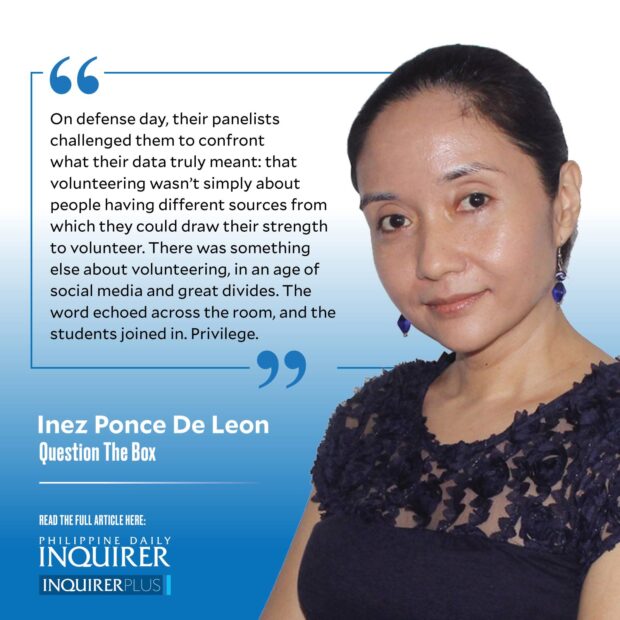Thesis journeys and unearthing truths
Last week, our department held its annual best thesis competition.
The top 3 theses win best thesis, and should be either a research study or project that encapsulates the best that a communication major has to offer: the ability to link theory to data-gathering methods; the discernment to recognize a social problem; and the depth to discuss findings and draw out their implications or the creativity to translate findings into a project, whether a campaign, event, film, or any kind of communication intervention.
This year, our top thesis students created research posters to represent their work, set up these posters in a public exhibit, and had their work judged by an external panel of academics.
This year, two of the three winning groups were my advisees.
I’ve already written about one group: Aiden Bravo, Aiza Delgado, and Phyllis Ong, who studied women’s experiences on the light rail transit (LRT) systems and came up with a campaign to promote women’s safety.
My other group, Bianca Gadia, Arianna Lopez, and Louisa Tagulinao, examined what made young people volunteer in the last election, and how volunteering could be sustained offline, beyond the election period.
They thought that they would find young people clamoring for change, wanting great things for the country, excited to serve the Philippines.
What they discovered was a scathing indictment of some volunteers.
Following interviews, they uncovered how volunteering sometimes had little to do with one’s need to practice good citizenship. It centered, rather, on personal comfort.
The volunteers who spoke thus usually had a high allowance, access to transportation, friends who could join them in their volunteering, and a private school education that helped them interpret political issues.
To these volunteers, volunteering was about ease, accessibility, and convenience. This contrasted with some other volunteers who came from places farther away, and who lived in unsafe neighborhoods. Their language, my students said, was grounded, heartfelt: they were not out to save the country from afar; they were embedded, listening, and understanding.
My students did not expect to encounter such a glaring gap. On defense day, their panelists challenged them to confront what their data truly meant: that volunteering wasn’t simply about people having different sources from which they could draw their strength to volunteer.
There was something else about volunteering, in an age of social media and great divides. The word echoed across the room, and the students joined in.
Privilege.
The students nodded, smiled, sighed.
This is the true thesis experience. It is not simply asking questions and getting answers. To do a thesis is to critically examine what has been: a past, an event, a phenomenon, a concept, a construct. The task means unearthing truths so that they might lead to an awakening, an enlightenment.
In the case of my LRT campaign group, a step out of their comfort zone allowed them to see that the claim of protecting women masked a deep-seated culture of misogyny. In the case of my online/offline volunteerism students, a step out of their comfort zone allowed them to see that there were indeed volunteers whose language betrayed hero worship—something that they faulted in other people, but could not see in themselves.
For my volunteerism group, the thesis experience meant being angry at how privilege, in all its forms, has divided the country. Even though there were volunteers who were truly earnest in their service, there were others whose commitment hinged on convenience. These volunteers were often the most vocal, the most visible online. They hardly ever mentioned serving a country that existed beyond the lines of social media, outside of the volunteer center, out of their circle of friends.
Little wonder, then, that there are pockets of people who refuse to help anyone that did not share their vote, or who threaten to withhold aid from provinces that are damaged by natural hazards only because they voted differently.
I hope that those who came to the exhibit saw these posters, and interpreted the research as courageous unraveling. I hope they saw my students’ posters as a confrontation, a call to true nationalism, where we recognize the truths in ourselves before pointing out the lies in others.
iponcedeleon@ateneo.edu





















